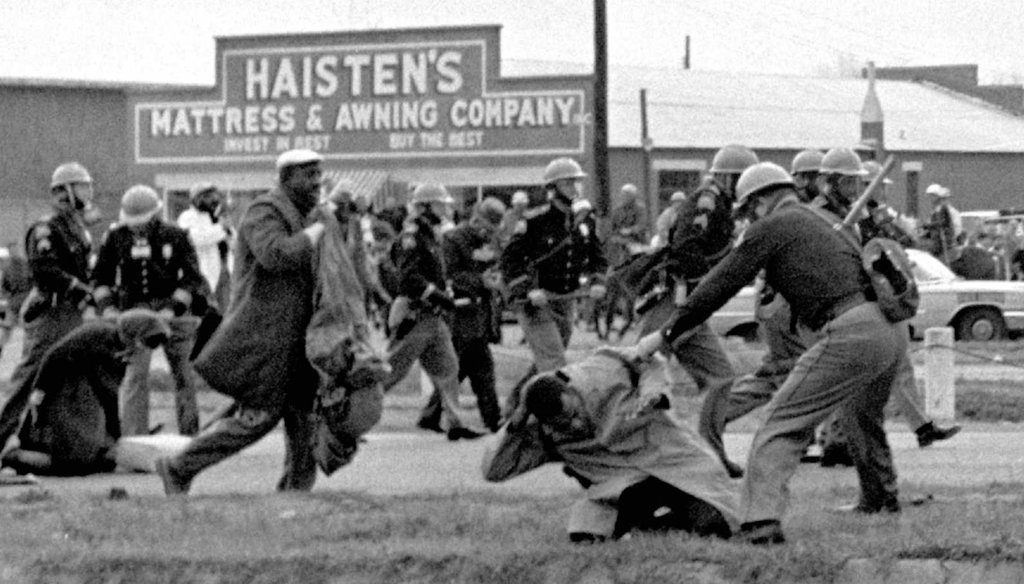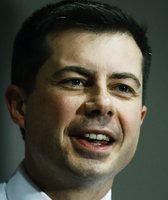Get PolitiFact in your inbox.

On March 7, 1965, Alabama state troopers beat civil rights marchers in Selma, Ala. This month marks the 50th anniversary of a day that led to passage of the Voting Rights Act of 1965. (AP)
This week marks the 50th anniversary of "Bloody Sunday" -- the day police beat voting-rights activists as they attempted to march from Selma to Montgomery, Ala.
President Barack Obama, former President George W. Bush and nearly one-fifth of Congress will be in Selma this weekend to mark the anniversary.
On March 7, 1965, hundreds of peaceful protesters set out to march for voting rights. But as depicted in the movie Selma released earlier this year, police met them on the Edmund Pettus Bridge and attacked them with clubs, whips and tear gas. Selma became a turning point in the civil rights movement, leading to the passage of the Voting Rights Act just five months later under President Lyndon B. Johnson. The law was designed to prevent the denial of voting rights based on race.
In recent years, PolitiFact has fact-checked a wide variety of claims on voting rights, including statements made by Obama and Attorney General Eric Holder, as well as by politicians in Florida, Georgia, Rhode Island, Texas, Virginia and Wisconsin. Here’s a look at some of our fact-checks:
Preclearance and the Voting Rights Act
Under the Voting Rights Act, several states and portions of states that had a history of discrimination, including certain counties in Florida, needed to get preclearance from the federal government before changing voting laws. But that portion of the Voting Rights Act was challenged by Shelby County, Ala., and the U.S. Supreme Court sided with the plaintiffs in 2013.
A few days before the justices heard oral arguments in the case, U.S. Rep. John Lewis, D-Ga., argued in favor of keeping the provision. Lewis, who chaired the Student Nonviolent Coordinating Committee at the time, suffered a skull fracture in the Selma protest.
He said the critics of the law "complain of state expense, yet their only cost is the paper, postage and manpower required to send copies of legislation to the federal government for reviews, hardly a punishment," Lewis wrote.
For administrative reviews on minor issues, Lewis appeared to be correct. The Justice Department provided an administrative process for pre-clearance submissions that was designed to cut litigation costs. But states could also choose to take cases through the courts, which could be expensive. We rated his claim Half True.
During oral arguments, Chief Justice John Roberts asked, "Do you know which state has the worst ratio of white voter turnout to African-American voter turnout? Massachusetts. Do you know what has the best, where African-American turnout actually exceeds white turnout? Mississippi."
The survey data Roberts likely used about Massachusetts is questionable due to wide margins of error, among other problems. Also Roberts’ decision to hold up Massachusetts as an example amounts to cherry-picking, since its data diverges significantly from that of its regional neighbors.
However, Roberts made a valid point when he noted that black voter turnout in Mississippi and other Deep South states is high, and often exceeds white turnout. We rated his claim Half True.
In 2014, Attorney General Eric Holder warned Florida Republican Gov. Rick Scott that the federal government was monitoring voter access after the state had "repeatedly added barriers to voting and restricted access to the polls."
But Scott’s campaign pointed the finger back at Holder:
"In fact, Attorney General Eric Holder’s own Justice Department precleared the voting changes in the 2011 law that governed the 2012 general election in Florida," Scott campaign manager Melissa Sellers wrote.
The Scott response was partially accurate but left out a lot of context. In 2011, the GOP-led Legislature cut the number of days of early voting from 14 to eight, among other election changes. The law, signed by Scott, allowed supervisors to offer between 48 hours and 96 hours of early voting over eight days.
Scott’s statement omitted that the Justice Department only signed off on the state’s plan after it committed to offering the maximum hours for early voting in those counties. We rated Scott’s claim Half True.
Justice Department and voting rights cases
We looked at Obama’s claims about how aggressively the U.S. Justice Department investigated obstacles to voting. During the week of the 50th anniversary of the Civil Rights Act in April 2014, Obama said in a speech that Republicans passed laws "making it harder, not easier, for people to vote" and noting that the Justice Department had "taken on more than 100 voting rights cases since 2009."
Those 102 cases included instances in which the department was the plaintiff, defendant or played some other role. So the Justice Department didn’t initiate the action in all of those cases. Because Obama was vague about what he meant by "taken on" cases we rated this claim Half True.
Texas Republican platform
In a Texas gubernatorial debate, Democrat Wendy Davis said of her Republican opponent (and eventual victor) Greg Abbott that he "heads up a party whose platform calls for the repeal of the Voting Rights Act."
Davis was right about the platform adopted by delegates to the Republican Party of Texas convention in June 2014, which says: "We urge that the Voter Rights Act of 1965, codified and updated in 1973, be repealed and not reauthorized." That provision appears, though, after another entry: "We support equal suffrage for all United States citizens of voting age who are not felons."
Abbott isn’t his party’s chief, though any governor has a role in guiding his or her state party. On balance, PolitiFact Texas rated this claim Mostly True.
Florida’s noncitizen voter purge
Leading up to the 2012 election, Florida Secretary of State Ken Detzner led an effort to purge noncitizens from the voter rolls. The effort was rife with errors, including the inclusion of Bill Internicola, a Brooklyn-born World War II veteran and longtime voter in Broward, on a list of residents flagged as possible non-citizens.
Democratic U.S. Rep. Alcee Hastings asked Internicola at a press conference whether the Broward Supervisor of Elections had mailed him a stamped envelope to send back his proof of citizenship. The answer: no. That led Hastings to say this:
"There is also a backdoor poll tax. In the letter that he (Internicola) received I asked him a moment ago he did not have a prepaid envelope to send it back meaning he had to buy a stamp. Don’t tell me how little it is -- that stamp is a cost. And the state should not be about the business of emaciating voter rights. They should be in the business of causing people to participate."
Hastings is correct that there were some similarities between the poll tax and Florida’s search for non-citizen voters, including that minorities in both cases were disproportionately affected. But there are some important differences. For instance, the poll tax had a far more widespread impact. We rated that claim Half True. (Detzner ultimately abandoned the purge and a court later ruled that his effort violated the National Voter Registration Act.)
Voter ID
During a January 2015 speech in Iowa, Wisconsin Gov. Scott Walker said, "We require in our state, by law, a photo I.D. to vote."
The 2011 voter I.D. law in question was signed by Walker, though was used only once -- in a February 2012 primary -- before being blocked by court challenges. Moreover, it can’t be enforced until the court case has been fully adjudicated, perhaps by the U.S. Supreme Court.
Walker’s statement is partially accurate, but leaves out important details, so PolitiFact Wisconsin rated it Half True.
Incarceration rates
Musicians John Legend and Common won the Best Original Song Award for a song from Selma during this year’s Oscars. In accepting the statuette, Legend offered a striking claim: He said, "We live in the most incarcerated country in the world."
We found that the United States does incarcerate many more people than its peers do, when measured by the portion of the population behind bars, and despite having a comparable amount of crime.
Technically, Seychelles -- an island chain off Africa in the Indian Ocean -- has a higher incarceration rate than the United States does, but experts say its small size makes it an outlier. PunditFact rated this claim Mostly True.
Hear a claim about voting rights or other topics worthy of a fact-check? Email [email protected] or #PolitiFactThis
Our Sources
U.S. Department of Justice, "The voting rights act of 1965," and "About Section 5 of the Voting Rights Act," Accessed March 6, 2015
National Archives Eyewitness, "Confrontations for Justice," Accessed March 6, 2015
ProPublica, "Everything that has happened since the Supreme Court ruled on the Voting Rights Act," Nov. 4, 2014
Miami Herald, "Lawmakers and Obama to honor Selma’s ‘Bloody Sunday’ this weekend," March 6, 2015
Politico, "GOP leaders to skip Selma event," March 5, 2015
Washington Post, "Where black voters stand 50 years after the Voting Rights Act was passed," March 3, 2015




































